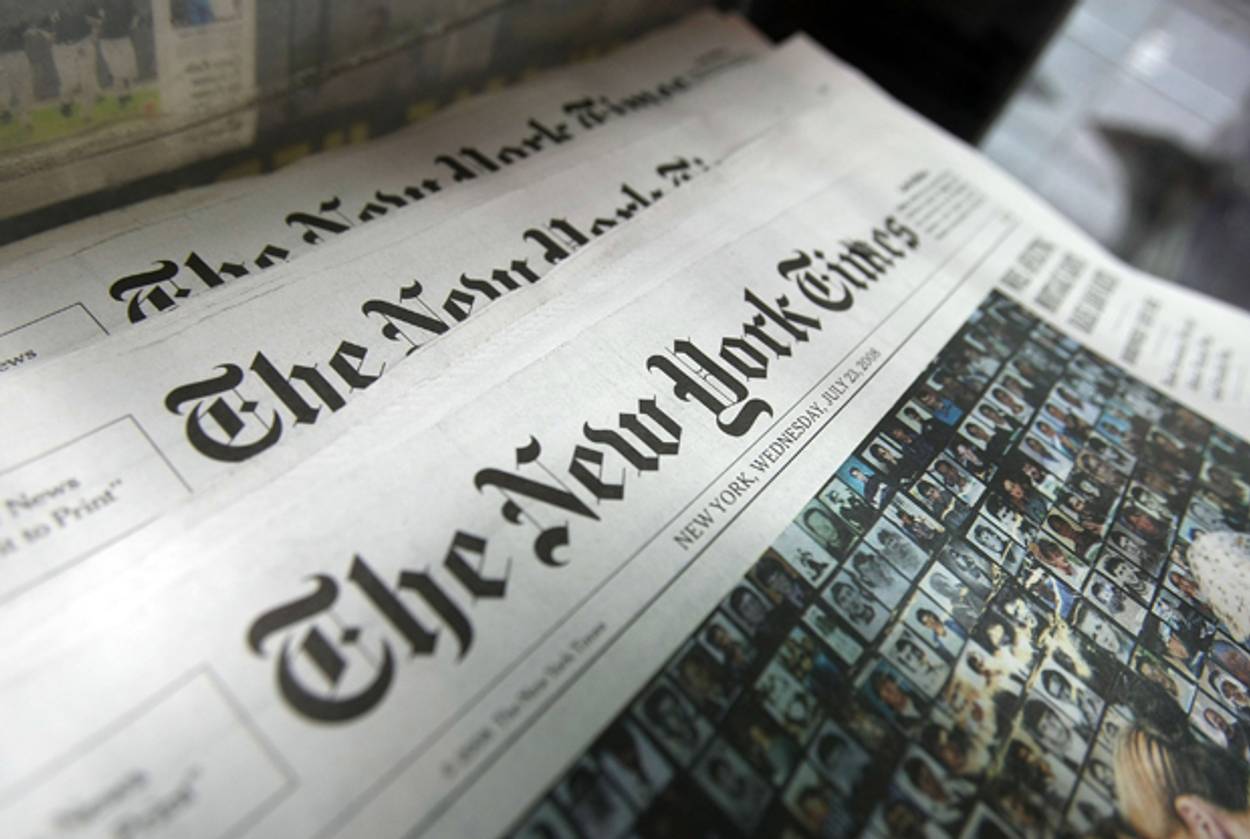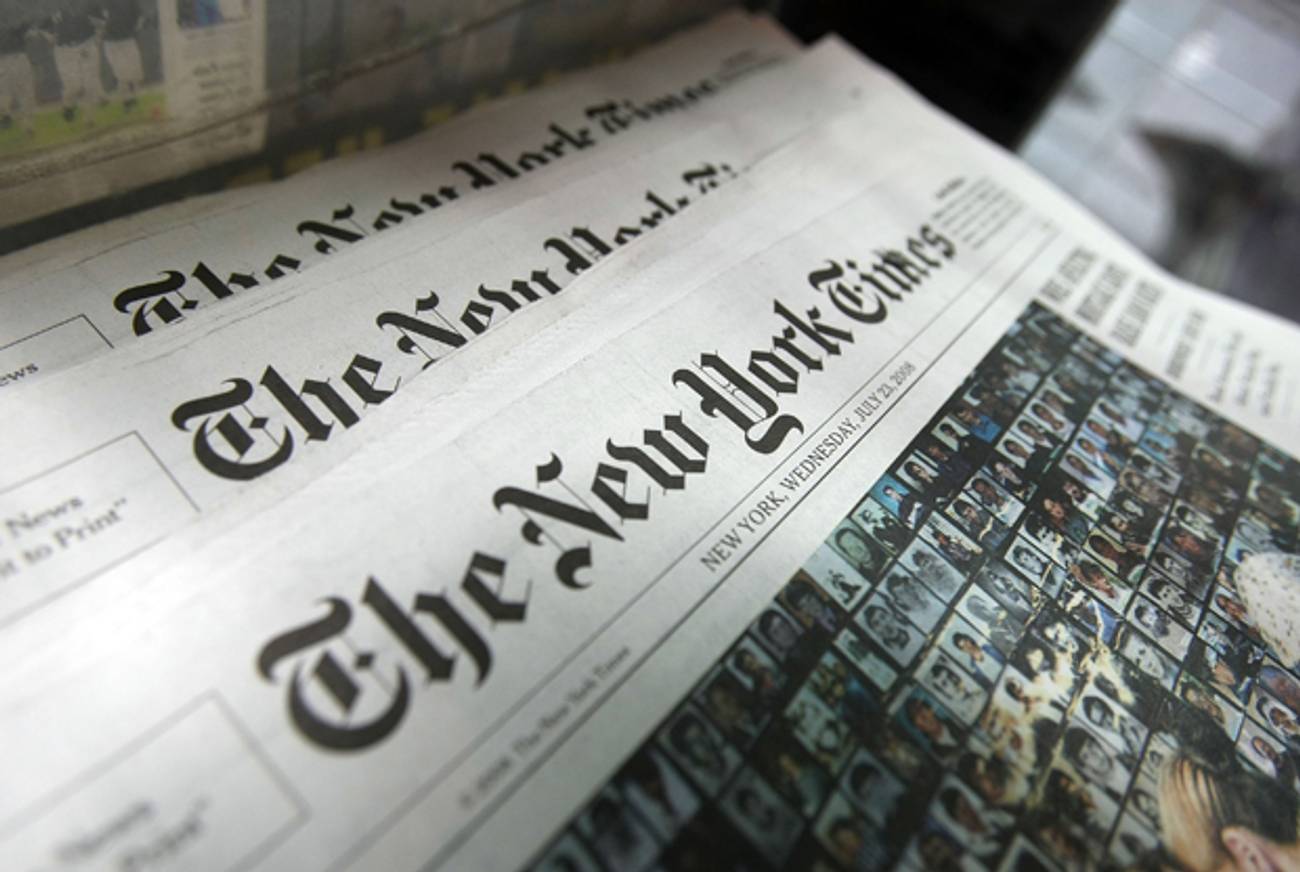The Truth About Israel and Dissent
The New York Times substitutes a bogus headline for actual reporting




You don’t have to be the Newspaper of Record to recognize the distinction between reported news pieces and op-eds. Even so, op-eds must still be subject to normal journalistic standards. When an opinion piece suggests a starkly different reality than the one the newspaper’s own correspondents and editors have conveyed to readers, you’d expect a serious outlet like The New York Times to carefully scrutinize the contribution and, should it fail to support its own arguments in a thoroughly convincing way, reject it.
Little of this diligence was on display this weekend when the Times published an opinion piece titled “How Israel Silences Dissent.” The harsh headline suggested blow-by-blow accounts of reporters rounded up, activists stopped for interrogation, and other means of intimidation—a curious proposition as no such horrors have been reported by the Times’s correspondents on the ground. One imagines that the piece rocketed to #1 on the Times website almost instantaneously precisely because it promised to blow the lid off the repressive ethno-centric Jewish dystopia that some Times readers believe exists, contrary to the paper’s own reporting, and that other readers see in their nightmares.
Instead, what followed was a sophomoric rant that was as loose with the facts as it was heavy on the pathos. The op-ed’s author, Mairav Zonszein, is a writer for the left-leaning +972 Magazine, and to hear her tell it, the ghosts of bigotry howl everywhere in the Jewish State. Israel—by which she seems to mean the entire country—has traded in all and any hints of complexity, empathy and other civilized human characteristics for a howling “us-versus-them mentality” that grows more violent and benighted each day.
A concerned and reasonable reader—a category that, presumably, ought to have also included the Times editors considering Zonszein’s contribution for publication—should require that such dire allegations be backed by facts, and Zonszein plays her strongest card up top: on one or two occasions, she writes, a handful of right-wing hooligans assaulted pro-peace protestors in Tel Aviv and Haifa. “Prime Minister Benjamin Netanyahu,” Zonszein gravely informs her readers, “made no statement condemning the violence.”
Now let’s assume for a moment that a handful of altercations are sufficient grounds to divine the mood of an entire nation. Let’s also give Zonszein the benefit of the doubt and agree that it is the prime minister’s primary duty—and not, say, the responsibility of the police—to stop everything and address the nation whenever a gaggle of brutes take to the streets. And let’s forget for a moment the normal and well-documented fact that any society at war is likely to rally around the flag and experience a surge of suspicion towards the people who declare themselves to be their enemies, or shoot rockets at them. But even if we put all of that aside, Zonszein’s argument still comes crashing against the brick wall of hard fact: The altercation with which she begins her piece was organized by Yoav Eliassi, known as Ha’Tzel, or The Shadow, a second-tier Israeli rapper with extreme political views. In late July, as the war in Gaza was still raging, Shai Piron, Israel’s Minister of Education, did in fact go on national television to denounce Eliassi, and anyone else who resolved political disagreements with his fists.
“Such actions,” Piron thundered, “are hurting the moral ethos of our exemplary society.” Eliassi, Piron said, calling on his training as a rabbi, was “polluting the souls of Israeli children.” Not exactly the stuff of tribal drumbeats.
Zonszein’s other attempts at providing evidence to support her thesis are just as silly. She tells that Haaretz’s Gideon Levy received death threats after writing a particularly controversial article accusing Israeli pilots of being immoral murderers. She does not, however, tell us that while some Israelis cancelled their subscription to Haaretz following the column, many others signed on in solidarity with Levy’s right to speak his mind. If you do the math—which is not something that dogmatists bother doing very often—the numbers are telling: 1,644 readers abandoned Haaretz across its various subscription offerings (the daily newspaper, the weekend edition, and the stand-alone digital package), while 4,728 joined it.
The flight of fancy continues in nearly every sentence in the piece. Just a few days after a comprehensive opinion survey found the overwhelming majority of Israeli citizens to be secular and liberal, Zonszein—providing no evidence of her own—faults Israeli society for being “unable and unwilling to overcome an exclusivist ethno-religious nationalism.” She argues that Israel has never “genuinely addressed the fact that non-Jewish Arabs who generally identify as Palestinian account for about 20 percent of the population,” even though anyone even remotely familiar with Israeli society knows that perhaps no other fact is as heatedly debated in academia, in the media, in parliament and elsewhere. With each sentence, the society that Zonszein describes looks less and less like Israel as it is—a country struggling against a host of existential threats, imperfect like any other democracy—and more like a cartoonish term paper that an undergraduate might produce on deadline after hitting the bong.
If Zonszein is far from the finest thinker and writer, it is much more difficult to excuse the Times this lapse of judgment. If the newspaper truly believes Zonszein’s premise, it should push its reporters on the ground to do their jobs and report on these very serious allegations: if Israel has joined the ranks of the world’s most benighted regimes, and is silencing the voices of dissenters, such news ought to be reported not on the op-ed page but on the front page. Otherwise, it’s hard not to see the decision to run Zonszein’s piece as driven, at best, by the reckless calculation of click-bait, or by the same lazy narratives of convenience that paint Israel as a black-and-white villain because it makes the world easier to understand.
But there’s time for repentance yet: if the Shrinking Grey Lady cares so deeply about quashing dissent, it may want to consider having one of their reporters place a call to Mudar Zahran, a leader of the Palestinian community in Jordan who used his own connections to convince Gazans to speak freely about life under Hamas. “If Hamas does not like you for any reason,” went one typical testimony, “all they have to do now is say you are a Mossad agent and kill you.” That’s what silencing dissent sounds like. And substituting a bogus story with an incendiary headline for a real story in order to maintain a simplistic narrative of heroes and villains has nothing to do with the practice of journalism. Rather, it’s what journalism was invented to guard against.
Previous: What the Times Gets Wrong About Israel
Liel Leibovitz is editor-at-large for Tablet Magazine and a host of its weekly culture podcast Unorthodox and daily Talmud podcast Take One. He is the editor of Zionism: The Tablet Guide.